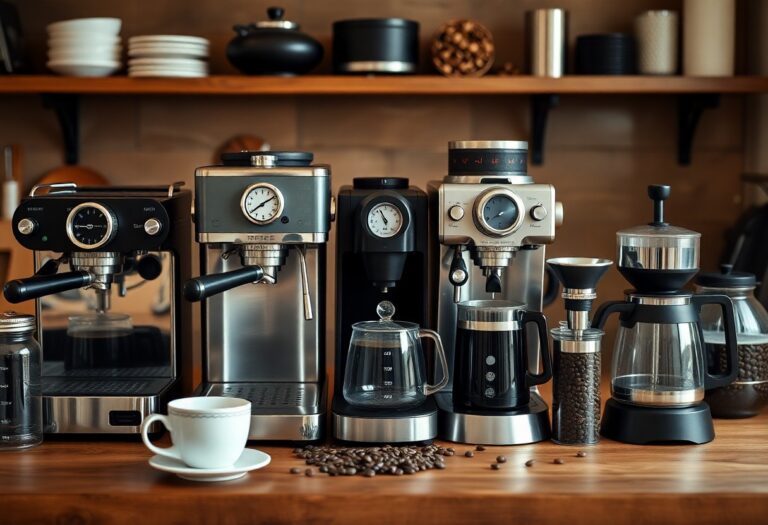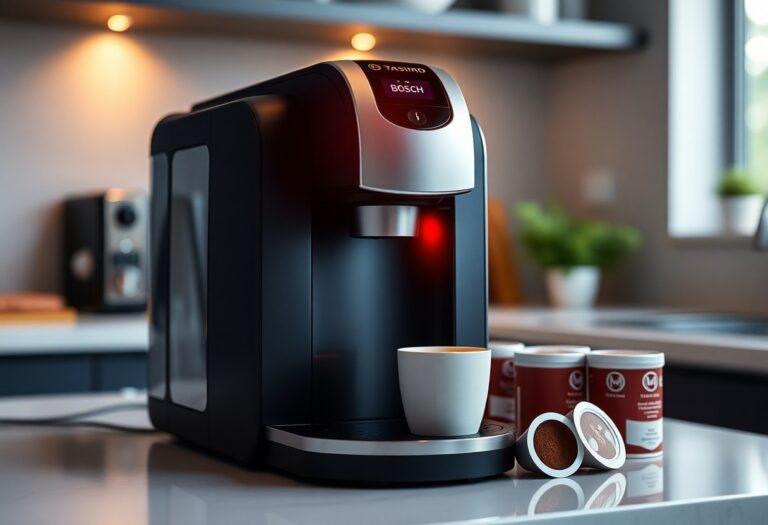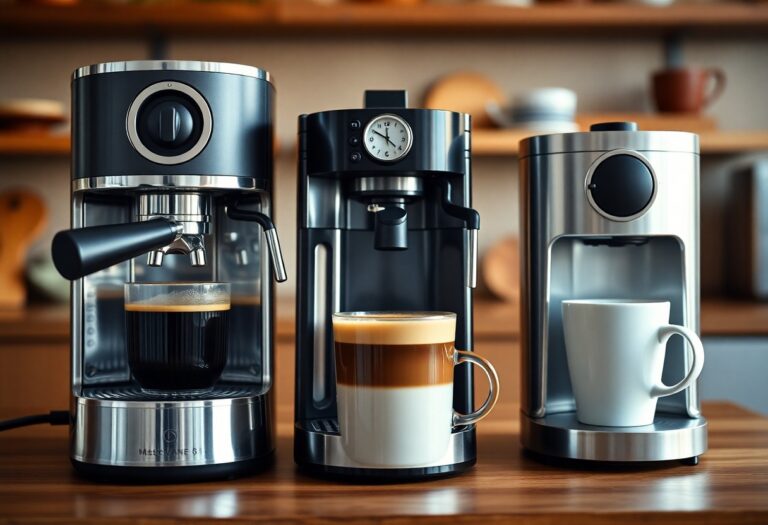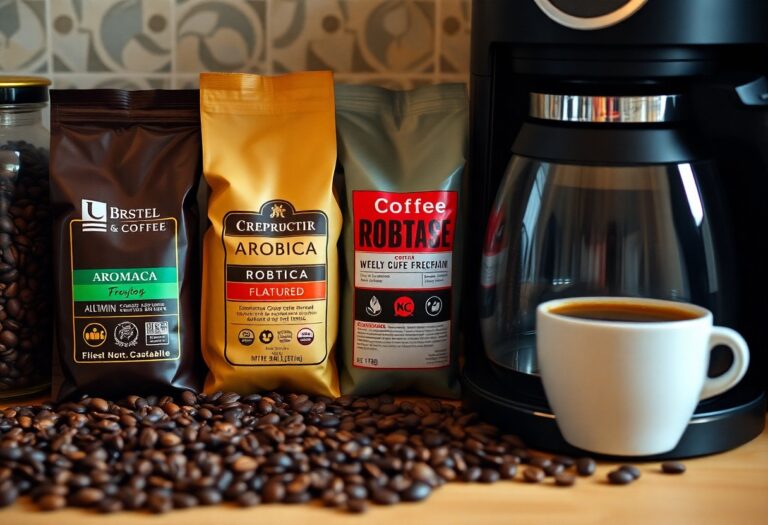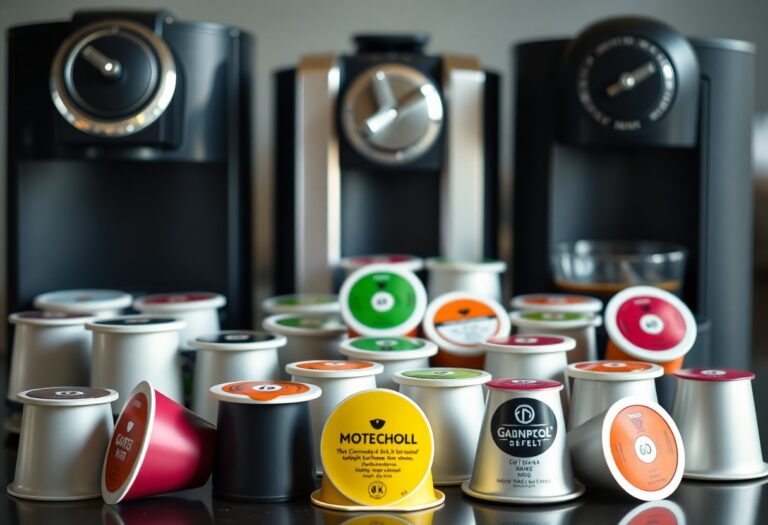What Water to Use for a Coffee Machine – Water Quality Guide
There’s a significant impact that water quality has on your coffee’s flavor and aroma. Using the right water can enhance your brew, while poor-quality water can lead to off-putting flavors and possible harm to your machine. You’ll want to consider factors like mineral content and filtration when choosing your water. For a comprehensive understanding, check out Everything You Should Know About Water for Coffee. Aim for water that complements your coffee for the best experience possible!
Key Takeaways:
- Optimal water for coffee machines is filtered or purified water to enhance flavor and prevent mineral buildup.
- Avoid hard water as it can contain high mineral content, which may lead to scale formation in the coffee machine.
- Using bottled water should be considered, but ensure it is low in minerals and void of any strong flavors.
- Water temperature also plays a role; ideally, it should be between 195°F to 205°F for brewing coffee.
- Regular maintenance of the machine including descaling helps preserve the quality of the coffee and the machine’s longevity.
Water Composition and Its Impact on Flavor
The composition of water you use will significantly influence the flavor profile of your coffee. Different minerals and compounds contribute to how well the coffee extracts its rich flavors and aromas. A balance of these dissolved substances can enhance the taste, while an improper mix may lead to bland or unpleasant brews, affecting your overall coffee experience.
Understanding Total Dissolved Solids (TDS)
Total Dissolved Solids (TDS) refers to the total concentration of dissolved substances in your water, which can include minerals, salts, and organic matter. A TDS level between 150 to 300 mg/L is generally optimal for brewing coffee. Levels significantly higher might overshadow the coffee’s natural flavors, while too low can lead to under-extraction, yielding weak, lackluster brews.
The Role of Minerals: Calcium, Magnesium, and Sodium
Minerals play a vital role in the coffee extraction process, with calcium, magnesium, and sodium being primary contributors to flavor. Calcium enhances the body and mouthfeel, while magnesium boosts sweetness and rounds out the acidity. Conversely, sodium, when present in moderation, can accentuate sweetness and reduce bitterness.
Finding the right balance among these minerals is necessary for achieving the desired coffee flavor. For instance, a blend with approximately 30-50 mg/L of calcium and 10-20 mg/L of magnesium provides a robust extraction. High levels of sodium, however, can alter the flavor negatively, often leading to a metallic taste. Water with optimal mineral levels will not only enhance the extraction but also enrich the overall sensory experience of your cup of coffee. Aim for a well-rounded water profile, as it can be the difference between a mediocre coffee and an extraordinary brew.

Evaluating Water Sources: Tap vs. Bottled vs. Filtered
Choosing the right water source for your coffee machine plays a vital role in the overall quality of your brew. Each option—municipal tap water, bottled water, and filtered water—comes with its own distinct attributes that influence not just your coffee’s taste, but also your machine’s health and maintenance needs. Understanding the pros and cons of these sources can help you decide which best suits your brewing preferences.
Pros and Cons of Municipal Tap Water
| Readily available | Convenient and easy to use |
| Affordable option | Cost-effective for daily use |
| Contains imperative minerals | Can enhance flavor |
| Can contain chlorine | Affects taste and aroma |
| Hard water issues | May lead to limescale buildup |
| Variable quality | Depends on regional supply |
The Benefits of Bottled Spring Water
Bottled spring water stands out due to its purity and balanced mineral content, providing a refreshing and clean tasting coffee. Sourced from natural springs, this water undergoes minimal treatment, preserving imperative minerals that contribute to an enriched flavor profile. If you’re after a consistent and high-quality taste for your coffee, bottled spring water may be a reliable choice for your brewing rituals.
Advanced Filtration Systems: Are They Worth It?
Investing in an advanced filtration system can elevate your coffee brewing experience, as these systems effectively eliminate impurities. By providing water free from chlorine, sediment, and excessive minerals, they create a cleaner, more flavorful cup. Furthermore, filtered water can prolong the lifespan of your coffee machine, minimizing maintenance costs.
- Improved flavor consistency
- Reduction of contaminants
- Long-term cost savings on maintenance
- Enhanced aroma and taste
| Eliminates sediment and chlorine | Provides a purer taste |
| Minimizes scale buildup | Extends the life of your coffee machine |
| Can be tailored to specific impurities | Offers customizable filtration solutions |
Hard vs. Soft Water: Finding the Right Balance
Your choice between hard and soft water can significantly influence your coffee brewing experience. Hard water, containing high levels of calcium and magnesium, often leads to scaling in machines and can alter coffee extraction, while soft water, low in these minerals, enhances flavor but may strip some crucial compounds. Finding the right balance between these two types is crucial for optimal coffee brewing and machine longevity.
Characteristics of Hard Water and Its Effects on Coffee
Hard water is characterized by elevated levels of minerals, particularly calcium and magnesium. While these minerals are beneficial to your health, they can negatively impact your coffee, resulting in a bitter or flat taste and leading to scale buildup within your coffee machine that can impair performance over time.
Benefits of Soft Water: A Double-Edged Sword
Soft water is excellent for extracting delicate flavors and aromas from coffee, creating a smoother, more enjoyable cup. However, the absence of crucial minerals may result in a less balanced taste, causing your coffee to taste flat or overly acidic. Therefore, while soft water enhances clarity and brightness in flavor, it can also diminish depth and complexity.
The use of soft water can be a mixed blessing in your coffee brewing journey. If you routinely use distilled or reverse osmosis water, you might enjoy the benefit of cleaner, crisper flavors in your coffee. However, you might also find that your brews lack the rich undertones or depth that minerals can provide. Many coffee aficionados recommend a blend of both types to maintain flavor balance; for instance, mixing filtered water with a small pinch of sea salt can help restore crucial minerals without compromising the purity of your coffee. Ultimately, achieving the ideal taste may require some experimentation to find the blend that works best for your palate.
Testing Your Water Quality: Essential Parameters
Knowing the quality of your water can make all the difference in your coffee experience. Key parameters to assess include hardness, pH level, and contaminants. Conducting a simple at-home water test can provide insight into whether your water is suitable for brewing. For more in-depth advice on this topic, check out Demystifying Water for Coffee.
Measuring pH Levels for Optimal Brewing
pH levels directly affect the extraction of flavors during brewing. Ideally, water should have a pH between 6.5 and 7.5 for optimal coffee taste. Water that is too acidic (low pH) can lead to sour flavors, while overly alkaline (high pH) water may result in flat or bitter coffee. Regularly testing your water’s pH helps ensure you’re brewing with the best possible flavor profile.
Identifying Contaminants: What to Look For
Contaminants in your water can disrupt the delicate balance needed for a great cup of coffee. Chlorine, metals, and organic compounds can impart undesirable flavors or even affect your machine’s performance. Regular testing can uncover these harmful elements that may be lurking in your water supply.
Beyond chlorine, which is often used as a disinfectant, look out for heavy metals such as lead and copper, which can leach into your water from old pipes. Even microorganisms can be an issue, so consider evaluating for potential bacterial growth if your water source is suspect. Using a multi-parameter test kit allows you to check these elements and ensure that harmful contaminants aren’t affecting your brew or your health.

Troubleshooting Water-related Coffee Issues
Identifying and addressing water-related coffee issues can significantly improve your brewing experience. If your coffee tastes bland, overly bitter, or off-putting, the quality of the water you use might be at fault. Often, such problems stem from mineral imbalances, high levels of chlorine, or even contaminants that can affect both flavor and aroma. You may also notice issues like excessive scale buildup in your coffee machine, leading to inefficient heating and extraction.
Common Problems Caused by Poor Water Quality
When your water lacks proper quality, it can lead to several issues in your coffee. Off-flavors can manifest if the water contains excessive chlorine or heavy metals. Scale buildup results from hard water, affecting the performance of your machine and delivering uneven extraction. Astringent coffee can be attributed to high mineral content, causing unbalanced flavors that mask the desired notes of your brew.
Solutions and Remedial Measures to Enhance Brew Quality
To improve your coffee’s flavor profile and overall quality, consider using filtered or bottled water specifically designed for brewing. Regular descaling of your coffee machine with citric acid or store-bought solutions can effectively combat mineral buildup. Using a water testing kit helps identify the specific impurities in your water, allowing you to apply targeted solutions for optimal brewing.
Investing in a good water filter can dramatically enhance your coffee experience. Options like activated charcoal filters or reverse osmosis systems can remove harmful impurities and adjust mineral balance, leading to a cleaner taste. Regular maintenance on your coffee machine, including descaling every few months, prevents performance issues and keeps flavors bright. By paying attention to water quality and making these adjustments, you’ll enjoy richer, more flavorful coffee that showcases the nuances of your chosen beans.
Conclusion
To wrap up, the quality of water you use in your coffee machine significantly impacts the flavor and aroma of your brew. Opt for filtered or bottled water that is free from impurities and minerals. Avoid distilled water, which can lead to flat-tasting coffee. By paying attention to your water source, you can enhance your coffee experience and ensure that each cup is as delightful as possible. Prioritize your water choice to elevate the tastes and nuances of your favorite blends.
FAQ
Q: What type of water should I use in my coffee machine?
A: It’s best to use filtered or bottled water when brewing coffee. Tap water may contain minerals, chlorine, and other impurities that can affect the flavor of your coffee and potentially harm your machine. If you prefer using tap water, consider using a water filter to reduce unwanted elements before brewing.
Q: How does the mineral content of water affect coffee taste?
A: The mineral content in water plays a significant role in the extraction of flavors from coffee grounds. Water with moderate levels of minerals, such as calcium and magnesium, promotes better extraction of flavor compounds, resulting in a richer taste. Water that is too soft or too hard can lead to subpar coffee flavor, making it vital to choose water with balanced mineral composition.
Q: Is distilled water suitable for coffee brewing?
A: While distilled water is free from impurities and minerals, it is not recommended for coffee brewing. Lack of minerals can lead to a flat taste because the extraction process is less effective. Additionally, some coffee machines may not function optimally with distilled water, as they require certain minerals to perform well.
Q: How does water temperature affect the coffee brewing process?
A: The temperature of the water used for brewing coffee is important for optimal extraction. Ideally, water should be between 195°F and 205°F (90°C to 96°C) for extracting the best flavors from coffee grounds. Using water that is too hot can lead to over-extraction, resulting in bitterness, while water that is too cool may produce weak and under-extracted coffee. Make sure your machine heats the water to the right temperature for the best results.
Q: Can I use sparkling or mineral water in my coffee machine?
A: Using sparkling water is not advisable as the carbonation can interfere with the brewing process and damage the coffee machine. Mineral water, on the other hand, can be used if it contains a balanced mineral content, but check for excessive levels of sodium or sulfates, which can affect flavor and machine performance. Overall, stick to still, filtered or bottled water for the best outcomes in brewing coffee.


